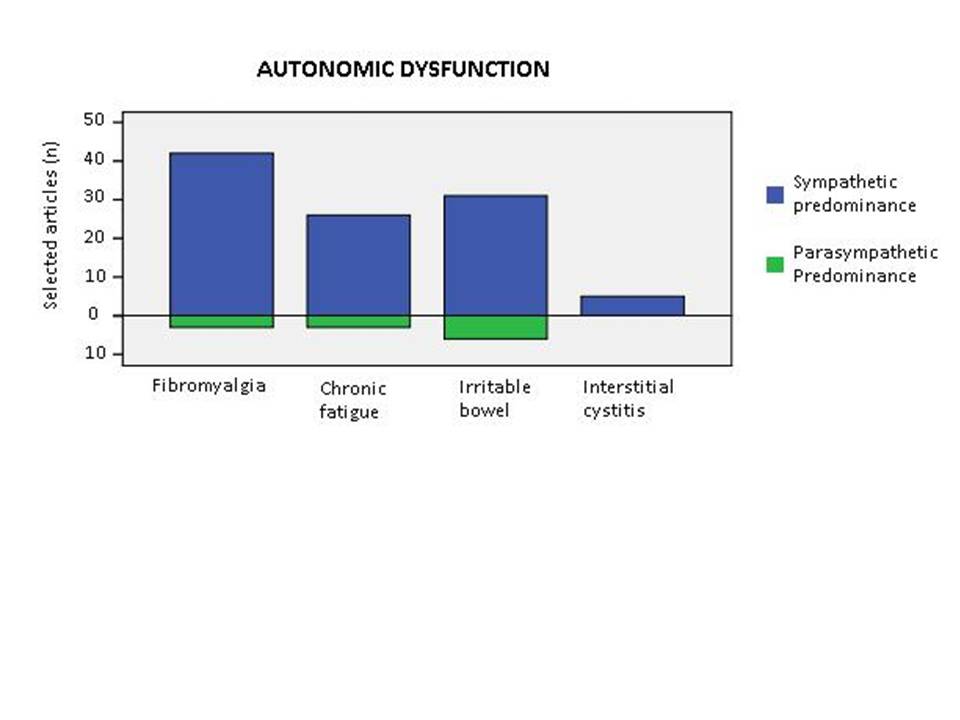Session Information
Session Type: Abstract Submissions (ACR)
Background/Purpose:
Fibromyalgia often coexists and overlaps with other common painful syndromes such as chronic fatigue, irritable bowel and interstitial cystitis. Yunus proposed the label “central sensitivity syndromes” as an umbrella term for these related maladies. Sympathetic nervous system dysfunction has been reported in these central sensitivity syndromes raising the possibility that such dysautonomia could be the common underlying pathogenesis that cluster fibromyalgia with these interrelated clinical entities.
Our objective: To carry out a systematic review of all published comparative case-control studies investigating sympathetic nervous system performance in fibromyalgia, chronic fatigue syndrome, irritable bowel syndrome and interstitial cystitis.
Methods:
PubMed and Embase were accessed using the following key words: autonomic (OR) sympathetic (AND) fibromyalgia, chronic fatigue syndrome, irritable bowel syndrome and interstitial cystitis. All entries up to April 30 2012 were reviewed by three investigators searching for case-control studies in humans. The Method for Evaluating Research and Guidelines Evidence (MERGE) adapted to the Scottish Intercollegiate Guidelines Network (SIGN 50) was used to rank the level of evidence contained in the selected articles. “Sympathetic predominance” was defined as statistically significant data suggesting higher sympathetic activity, decreased parasympathetic activity or both. Reverse definition applied for “parasympathetic predominance”.
Results:
See table. Heart rate variability analysis (36%) was the most often used method to assess sympathetic system performance. Other less frequently used methods were: Tilt table testing (9%), sympathetic skin response (9%) and genetic studies (5%)
The overwhelming majority of case-control studies described sympathetic predominance in these painful syndromes (figure). Heart rate variability analyses and tilt table testing disclosed a clear pattern of sympathetic dysfunction; basal sympathetic hyperactivity accompanied by sympathetic hypo-reactivity to stress.
Conclusion:
This systematic review suggests that sympathetic nervous system predominance is very common in these overlapping central sensitivity syndromes. This concordance raises the possibility that these syndromes may share similar clinical and pathogenic mechanisms.
|
Selected articles
|
Overall assessment MERGE – SIGN 50
|
Participants average age (years)
|
||
|
Quality |
n |
% |
||
|
Fibromyalgia n = 58 34.9%
|
High |
18 |
31.03 |
43.6
|
|
Medium |
38 |
65.52 |
||
|
Low |
2 |
3.45 |
||
|
Chronic fatigue n = 49 29.5%
|
High |
22 |
44.90 |
33.4
|
|
Medium |
25 |
51.02 |
||
|
Low |
2 |
4.08 |
||
|
Irritable bowel n = 50 30.1 %
|
High |
9 |
18.37 |
36.0
|
|
Medium |
33 |
67.35 |
||
|
Low |
7 |
14.29 |
||
|
Interstitial cystitis n = 9 5.4 %
|
High |
3 |
33.33 |
49.3
|
|
Medium |
5 |
55.56 |
||
|
Low |
1 |
11.11 |
||
|
Total = 166 |
Source: PubMed only =24.09 %, Embase only = 21.08 %, both databases = 54.81 %. |
|||
Disclosure:
L. A. Martinez,
None;
T. Mora,
None;
A. Vargas,
None;
M. Fuentes,
None;
M. Martinez-Lavin,
None.
« Back to 2012 ACR/ARHP Annual Meeting
ACR Meeting Abstracts - https://acrabstracts.org/abstract/sympathetic-nervous-system-dysfunction-in-fibromyalgia-and-in-overlapping-central-sensitivity-syndromes-a-systematic-review-of-controlled-studies/

